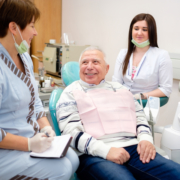Alcohol Awareness: Know the Symptoms of Addiction, Take Action
Know the Symptoms of Addiction, Take Action
We often raise a glass to remember someone who’s passed, celebrate a special occasion, and relax after a workday. With the prevalence of alcohol use, it may be tough to spot alcohol addiction in a loved one––or even yourself. Having a general alcohol awareness can encourage you to recognize the symptoms of alcohol addiction.
Why is Alcohol Awareness Important?
Alcohol is the most used substance in the U.S. and is the third-leading preventable cause of death. Annually, an estimated 95,000 people (approximately 68,000 men and 27,000 women) die from alcohol-related causes.
Alcohol use is widespread in our country and impacts our lives in different ways. All Americans need to know the signs and symptoms of alcoholism to possibly save the life of a loved one who may be addicted to alcohol.
Prevention is just as important as treatment. Speaking with your children and grandchildren about alcohol awareness and the dangers of underage drinking and binge drinking is important. You can play a critical role in informing young family members about the harmful impact drugs and alcohol can have on their lives.
What Are the Signs of Alcohol Abuse?
Alcohol is a legal drug in the U.S., but it still carries a significant risk of addiction. According to the American Addiction Centers, signs and symptoms of alcohol abuse include,
- Poor coordination
- Slurred speech
- Impaired thinking
- Memory impairment
- Wanting to stop drinking but not managing to do so
- Diverting energy from work, family, and social life to drink
- Being secretive about the extent of the alcohol abuse to protect it
- Engaging in risky behavior, such as drunk driving
- Being in denial about the extent of the alcohol abuse problem
- Becoming distressed at the prospect of not having access to alcohol
How Alcohol Use Disorder Impacts Your Life
If a loved one is unable to control their alcohol use, they may be suffering from Alcohol Use Disorder (AUD). People with a history of childhood trauma, drinking at an early age, and a family history of alcohol abuse are at a higher risk for alcohol use disorder.
Physical Impact
Abusing alcohol can significantly increase your risk for chronic health conditions such as cardiovascular disease, stroke, cancer, and high blood pressure. Heavy drinking also takes its toll on vital organs such as the liver and the pancreas.
Individuals with severe AUD often disregard their nutritional needs, frequently skipping meals. They may develop a nutritional deficiency, causing changes in the skin, hair, nails, and eyes.
Social Impact
As alcohol addiction consumes a loved one, they may withdraw from friends and family. Relationships can become strained and distant. Excessive drinking can also negatively impact your career. Alcohol abuse can cause you to miss work due to hangovers, lead to poor decision-making, and strain workplace relationships.
Emotional Impact
Consuming alcohol produces chemical changes in our brain. We often feel more relaxed when we have a drink or two. But, some individuals with AUD report that they become angry, anxious, depressed, or abusive when they drink. There is also a strong correlation between alcohol abuse and suicidal thoughts.
How to Get Help for Alcohol Abuse Disorder
Many people with AUD don’t seek treatment because they don’t realize they have a problem or are embarrassed that they can’t control their alcohol consumption. Overcoming an addiction on your own is nearly impossible. It is crucial to enlist the support of family and friends.
If you think you or a loved one may have a problem with alcohol, don’t be afraid to discuss treatment options with your doctor. You can also reach out to a resource below.





















































